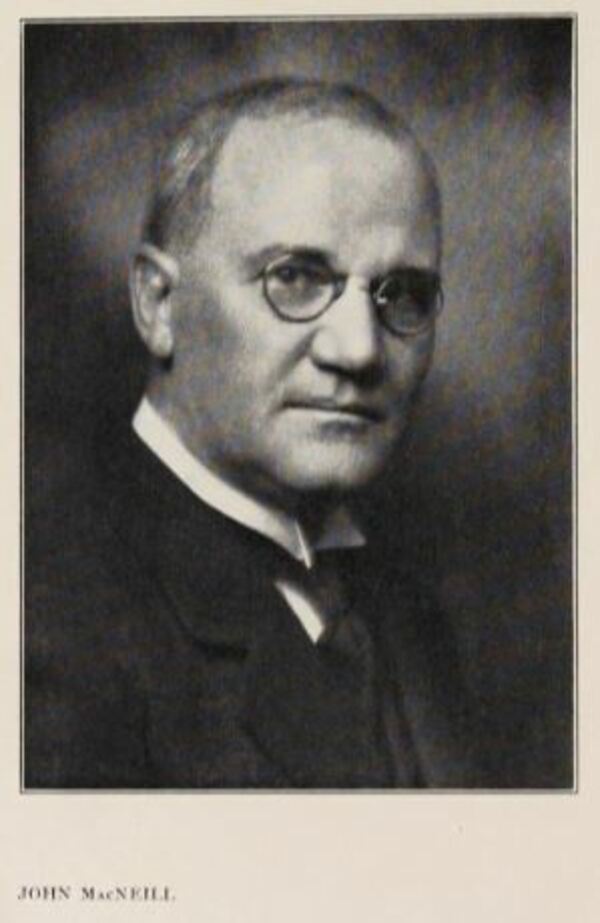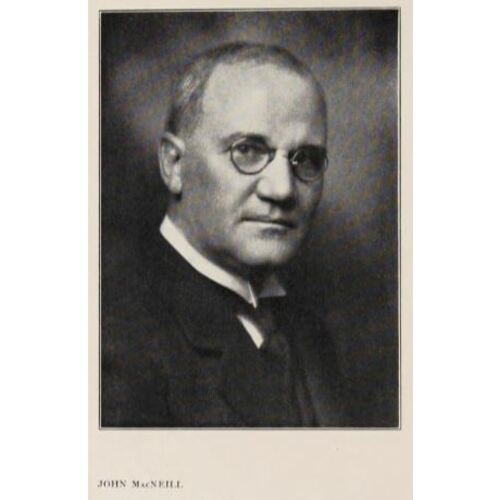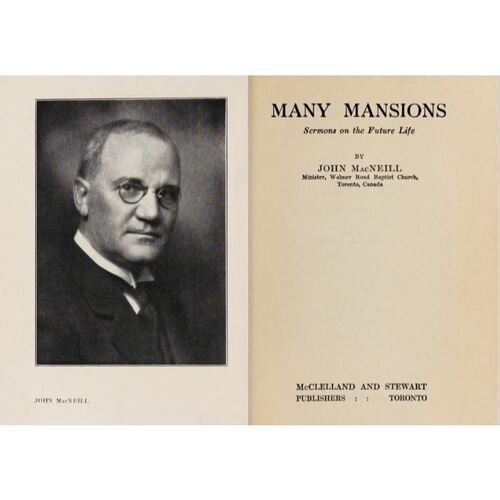
Source: Link
MacNEILL, John James, Baptist clergyman, educator, and author; b. 5 March 1874 near Paisley, Ont., son of John MacNeill and Agnes Thomson (Thompson), both natives of Scotland; m. 1 July 1915, in New York City, Olive Marion Culham (1886–1975), widow of the Reverend Elmore Harris, and they had three sons and two daughters; d. 10 Feb. 1937 in Hamilton, Ont., and was buried in Mount Pleasant Cemetery, Toronto.
Raised on a pioneer farm, John MacNeill graduated from high school in Walkerton and enrolled at McMaster University in Toronto in 1892. He obtained a ba in 1896, and before long began to lecture at Woodstock College and minister to the Baptist church in Tilsonburg (Tillsonburg). He attended theological courses at McMaster in 1898, but his studies came to an end with the death of his father in early 1899 and an invitation that spring to supply the pulpit of First Baptist Church, Winnipeg. Later called to the pastorate there and ordained in Winnipeg in October, he served First Baptist for seven years, quickly establishing a reputation as an exceptional orator (his success obliged the church to rebuild to a capacity of more than 1,600 seats; he even went on a six-week preaching tour of Australia in 1901). In 1906 he accepted a call to Walmer Road Baptist Church, Toronto, where he was to remain until 1930.
In Toronto, MacNeill’s fame as a pulpitarian grew, and standing-room-only services on Sunday attested to his popularity. The Walmer Road congregation would more than double in size during his tenure. His renown was no small accomplishment since there was much oratorical competition in Toronto: according to Baptist pastor and author Gilbert Gerald Harrop, the city then had a claim to being “the homiletical capital of the Protestant, English-speaking world.” MacNeill was a much-sought-after preacher in churches large and small, frequently travelling to the United States and Great Britain. One listener described his magnetism: “His piercing eyes flashed from one part of his congregation to another. There was no escaping the effect – he was not addressing an audience, he was speaking to persons, and with a terrible intimacy at that. I think that each one there felt that MacNeill knew something about his personal history.” It was at Walmer that MacNeill began to put a vision of social evangelism into practice. In 1912 the church established, in the Memorial Institute, an inner-city mission that would become, in the words of historian the Reverend Donald A. Goertz, “the largest and most comprehensive program of outreach in Canadian Baptist history.”
From 1916 to 1918 MacNeill served overseas as an honorary captain with the Young Men’s Christian Association, which provided physical comforts and spiritual support to members of the Canadian Expeditionary Force. Initially engaged for six months, he agreed to stay on and became head of religious services for one of the divisions in France. Upon his return to Canada, he resumed his pastorate at Walmer Road, was appointed honorary lecturer in evangelism at McMaster (a position he held for almost a decade), and participated in the YMCA’s campaign to raise $2,500,000 for its continuing war work. His years at Walmer were marked by an increasing involvement in denominational matters. Before the war he had served for a time as chair of the board of western missions of the Baptist Convention of Ontario and Quebec (BCOQ). Appointed in 1918 to the board of governors of the BCOQ-owned McMaster University, in 1919 he was elected the convention’s president, a one-year appointment. In this role he provided leadership for the Baptist element of the “Forward Movement,” a multi-denominational endeavour to reinvigorate church life.
MacNeill’s ecumenical spirit and emphasis on social justice placed him at odds with fundamentalist Baptists, in particular Thomas Todhunter Shields*, pastor of the Jarvis Street church in Toronto. During his ten years on the McMaster board, he was embroiled in the bitter fundamentalist-modernist debates dividing the BCOQ, debates that focused on allegations that the university was promoting a liberal theology. These disputes, which dated back to the early years of the century [see William James McKay*], culminated in a split of the denomination in 1927, the faction led by Shields being expelled from the BCOQ. MacNeill was commended by the board for his service to McMaster through this fractious period. Asked in 1928 whether he was a fundamentalist or a modernist, he said, “Neither. I dislike the terms. I’m a progressive conservative.”
International involvement also distinguished MacNeill’s ministry. In 1905, while still a young pastor, he had been chosen to deliver a keynote address at the first congress of the Baptist World Alliance (BWA) in London, England, an indication of his rising star. His concern for the global denomination led him to serve on, and chair (1926–34), the Canadian Baptist Foreign Mission Board. In 1928 he was made president of the BWA. His election to this prestigious position was seen as a great honour for Ontario Baptists because it placed them on the world stage, and it was a point of pride for rural churches because of MacNeill’s small-town roots. It also encouraged Canadian support for the alliance. As president, he travelled extensively and engaged in two international tours to bolster Baptist work and strengthen the denomination’s international organization and relations: in 1930 he went to Europe, visiting countries from Great Britain to Hungary and Italy to Scandinavia, and two years later he journeyed to Asia (Japan, China, Burma, and India). Illness would keep him from attending the BWA congress in Berlin in 1934 and he resigned as president that year. The recipient of two honorary dd degrees, from McMaster in 1918 and from Baylor University, Waco, Tex., in 1928, he published three books of sermons that extended his reputation and reach: World power: the empire of Christ (Toronto, 1914); Many mansions: sermons on the future life (Toronto, 1926); and Reality in religion (Philadelphia, 1934).
MacNeill’s contribution to the Baptist cause at home and the worldwide extent of his ministry had led to his appointment in 1930 as principal of the faculty of theology at McMaster, succeeding Abraham Lincoln McCrimmon, and as professor of practical theology there, positions he would hold until his death (he had declined in 1922 to allow his name to stand for the chancellorship of the university, which went to Howard Primrose Whidden*). McMaster moved from its original Toronto setting to its present-day location in Hamilton in 1930, and while his work was hindered by poor health after 1934, MacNeill played an important role in establishing his faculty at the new location as well as in bringing peace to a university racked by the theological turmoil of the 1920s. His sudden death at home after a heart attack was a shock. In his seven years as principal, he had acquired a reputation as both a gifted administrator and a gracious professor.
In the early decades of the 20th century, MacNeill was one of the BCOQ’s best-known preachers and public figures. Commentary from prominent leaders at his death confirms his considerable international reputation. However, his failing health and early death kept him from further developing as an elder statesman who could have helped McMaster and the BCOQ negotiate the difficulties of a fractured denomination and another world war.
There is no published biography of John James MacNeill. The most important source for his life is the John James MacNeill box in the Canadian Baptist Arch. located at McMaster Divinity College, Hamilton, Ont. This box contains files of newspaper clippings, originals or copies of documents, and sermon notes.
Canadian Baptist (Toronto), 1920–37. D. A. Goertz, A century for the city: Walmer Road Baptist Church, 1889–1989 (Toronto, 1989); “A missed opportunity: central Canadian Baptists and the Forward Movement, 1919–1920,” in Baptists and public life in Canada, ed. G. L. Heath and P. R. Wilson (Eugene, Oreg., 2012), 304–40. G. G. Harrop, “The era of the ‘great preacher’ among Canadian Baptists: a comparative study of W. A. Cameron, John J. MacNeill and T. T. Shields as preachers,” Foundations: a Baptist Journal of History, Theology, and Ministry ([Rochester, N.Y.]), 23 (1980): 57–70. [T. T. Shields], “The unveiling of Dr. John MacNeill,” Gospel Witness (Toronto), 5 May 1927: 1–2. Robert Wright, A world mission: Canadian Protestantism and the quest for a new international order, 1918–1939 (Montreal and Kingston, Ont., 1991), 75–106.
Cite This Article
Gordon L. Heath, “MacNEILL, JOHN JAMES,” in Dictionary of Canadian Biography, vol. 16, University of Toronto/Université Laval, 2003–, accessed March 1, 2026, https://www.biographi.ca/en/bio/macneill_john_james_16E.html.
The citation above shows the format for footnotes and endnotes according to the Chicago manual of style (16th edition). Information to be used in other citation formats:
| Permalink: | https://www.biographi.ca/en/bio/macneill_john_james_16E.html |
| Author of Article: | Gordon L. Heath |
| Title of Article: | MacNEILL, JOHN JAMES |
| Publication Name: | Dictionary of Canadian Biography, vol. 16 |
| Publisher: | University of Toronto/Université Laval |
| Year of publication: | 2025 |
| Year of revision: | 2025 |
| Access Date: | March 1, 2026 |




